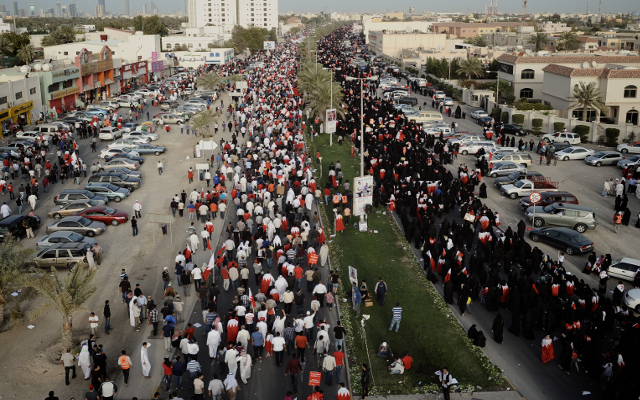As the United States (US) Government prepares to turn in for the holiday season – with Congress set to go on recess by the end of next week – its counterparts in the Arab Gulf are readying for an entirely different tradition. Over the last several years, the Gulf Cooperation Council (GCC) states – and particularly prime offenders like the Bahraini government – have exploited the winter holidays to ratchet up repression while many observers in their Western partners are temporarily on leave. Under the cover of Christmas or New Year celebrations around the world, the Gulf authorities have increasingly sought to carry out some of their most egregious or politically sensitive abuses, safe in the assumption that international criticism would be muted.
And 2017 has been no different.
At its outset, just 15 days into the year, the Government of Bahrain ended its de facto moratorium on the death penalty by carrying out its first executions since 2010. Three Shia men, Abbas al-Samea, 27, Sami Mushaima, 42, and Ali al-Singace, 21, were put to death by firing squad after being tortured into falsely confessing to a bombing attack on the police in 2014. Though the court was presented with exculpatory evidence, it was ignored. From their arrest until their death, the men never once met with a lawyer.
That same month, the Bahraini government reversed one of the only significant reforms it had made following its 2011 crackdown on the Arab Spring protest movement by restoring law enforcement authority to the National Security Agency (NSA). The NSA, an intelligence body that effectively serves as Bahrain’s secret police, was previously stripped of these powers in accordance with a recommendation of the Bahrain Independent Commission of Inquiry (BICI), which found that the institution was responsible for the torture and even extrajudicial killing of detainees. Since its re-empowerment, the NSA has been directly implicated in similarly egregious abuses, including a lethal January 2017 raid on a sit-in that ultimately left a young protester dead and a campaign of reprisals against human rights defenders like Ebtisam al-Saegh.
This is not the first year that the Bahraini government has used the holiday season to mask injustices. On 28 December 2014, the authorities arbitrarily arrested the prominent opposition leader Sheikh Ali Salman, Secretary-General of the now-dissolved Al-Wefaq National Islamic Society, and eventually imprisoned him on charges stemming solely from political speeches. His case has gone through various appeals and even a retrial, however he remains in prison serving a four year sentence. Though the United Nations (UN) Working Group on Arbitrary Detention (WGAD) concluded that Sheikh Salman was being held arbitrarily and should be immediately released with compensation, the authorities have now raised new charges alleging that he maintained illegal “intelligence contacts with Qatar.” In keeping with this trend, the Bahraini government has postponed the bizarre new case – which emerged only after the onset of the ongoing intra-GCC diplomatic row – to 28 December 2017.
Likewise, as 2017 comes to a close, the government continues to postpone and erratically reschedule the trial of Bahrain’s leading human rights defender, Nabeel Rajab. Rajab, the president of the Bahrain Center for Human Rights (BCHR), is already serving a two-year prison term for giving media interviews, but he could face another 15 years if he is convicted in the ongoing trial over charges stemming from comments he posted to social media. While the international community, including the US, has repeatedly expressed concern over Rajab’s case, the Bahraini government may try to skirt the full brunt of Western condemnation with a sudden holiday verdict.
Bahrain is not the only GGC state to take advantage of the underhanded opportunity offered by the holiday season. Neighboring Saudi Arabia has worked from the exact same playbook: on 2 January 2016, the kingdom carried out the country’s largest mass execution in over thirty years, putting 47 men to death, including a young Shia protester and Sheikh Nimr al-Nimr. Sheikh al-Nimr was a prominent Shia cleric and peaceful social justice activist from the Eastern Province town of Awamiyah who was known for strong criticisms of the Saudi monarchy. His arbitrary execution after an unfair trial sparked protests around the Middle East.
The GCC states – and especially Bahrain – rely deeply on US support, and they have developed a calculated strategy of taking their most provocative and repressive steps when they are least likely to cause international controversy that could upset that relationship. This holiday season, while so many are focused on private celebrations with family, the GCC security intuitions could be readying further attacks on critics and independent civil society. In Bahrain, the New Year might well begin with outrageous new prison terms for both the leading human rights defender and political opposition figure in the kingdom, solely because they expressed their opinions. The US and the other chief Western backers of the GCC states must remain vigilant as they settle in this holiday season, as the authorities in countries like Bahrain will remain hard at work. It is up to the international community to hold them accountable no matter the time of year.





